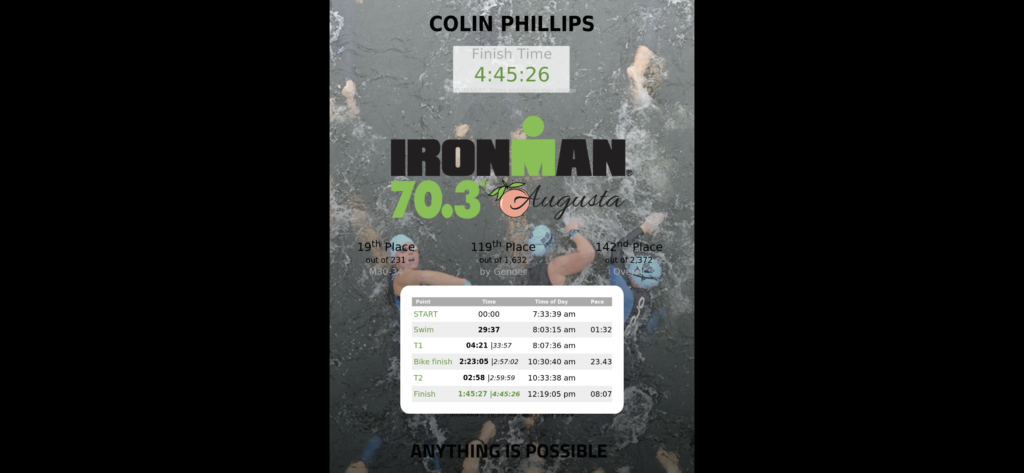Overcoming adversity: Ops Group Soldier earns 2016 USA Triathlon Military Sport Award
Article reposted from the Guardian.
By CHUCK CANNON, Guardian editor
FORT POLK, La. — Capt. David Mudek, Joint Readiness Training Center Operations Group, is the recipient of the 2016 Military Sport Award, presented by USA Triathlon, which recognizes the multisport successes achieved by men and women of the U.S. armed forces.
Mudek, a 2007 graduate of the United States Military Academy at West Point, New York, was a wrestler at West Point and said he looked forward to competing in combatives while on active duty. But an injury changed those plans. Mudek said he developed compartment syndrome, an ailment in which the area around a muscle becomes inflamed.
“Your muscle typically swells when you work out, then when you finish it goes back to normal,” Mudek explained. “If you have compartment syndrome, the muscle doesn’t return to normal — it stays swollen. When you work out the next time, it swells even more. Your muscle eventually runs out of space and what usually happens is you’re told not to use that muscle.”
Mudek said he learned of the malady while at West Point when he fell during a search and rescue event in New Mexico as a cadet and received the compartment syndrome diagnosis.“When I entered the Army and was preparing for Ranger School, I just dealt with it, and didn’t say anything to anyone, because the academy essentially told me if I complained about it, I would be medical boarded,” Mudek said. “While getting ready for the Ranger qualification course, it got so bad I ended up in the emergency room.”
The prognosis was not good. Mudek said he was given two options: Surgery, with its 20 percent success rate, and Mudek had four such compartments, or leave the Army via a medical board. He said he opted for surgery.
“To do the surgery, I had to go through six months of testing,” Mudek said. “During that six-month period, I was reassigned (from West Point) to Fort Benning, Georgia, and had to start the testing over again.
”Since the Ranger “Q” course was shorter than six months, Mudek was once again reassigned before the testing was complete, this time to Fort Bragg, North Carolina. The normally upbeat Mudek said frustration began to set in when testing began a third time.
“I got into a disagreement with the PA (physician’s assistant) I was seeing at Fort Bragg,” he said. “Things weren’t looking good.”
It was at this time that a surgeon friend of Mudek’s made an unlikely recommendation — force the issue by overtaxing the affected muscles. “My friend said that if I ran hard enough, it might be necessary for emergency surgery,” he said.
To put the necessary stress on the muscles, Mudek competed in five triathlons over a three-week period. “It worked,” he said. “I had the emergency surgery to fix the compartment syndrome.”
Not only did the triathlons provide the result Mudek hoped for, they also led him away from wrestling and into a new career.
“That’s how my triathlete career started,” he said. “My background had been wrestling. I knew if I didn’t get the surgery I wouldn’t be able to do combatives or take command, so I used triathlon to force the surgery. It just happened that in those five triathlons I entered, I finished in the top three in three of them.”
Once he recovered from his surgery, a friend and mentor who also built bicycles offered to build Mudek a bike and suggested giving triathlons a serious try. Mudek said he agreed to give it a shot and began racing.
“I started out with a team when I was at Fort Bragg,” he said. “I was pretty successful and worked my way up in classification, got a couple of sponsors, then moved to Fort Polk.”
Needing a club to secure sponsors for the equipment and travel required for national and international competition, Mudek started a team called Triple Victor Sports.
“At first the club had one athlete — me,” he said. “But it allowed my sponsors to sponsor a club instead of an individual. I started a Facebook page and within four months had 500 followers. I started calling the followers my club. I became a certified coach and put together the club.” Now two years old, Triple Victor Sports finished seventh in the 2016 world ranking and includes Soldiers — both active and retired — as well as civilians.
“We have doctors, both civilian and military, who help us overcome injuries and work with nutrition,” he said.
Mudek’s individual accomplishments have been impressive, especially considering he has only been competing in triathlons for four years. He has raced around the world and is a four-time all-world athlete and a two-time All-America Team USA.
Maj. Nathan Williams works with Mudek at Ops Gp. He said they are all proud of what the high-energy Soldier does, “even though we might not know what that is, because he’s working out all the time. “For him to compete at such a high level and still do his everyday job is amazing and an inspiration to everyone he works with. “He helps other Soldiers in the unit get better trained physically.”
Command Sgt. Maj. Brandon Kilgo agreed. “He’s more our coach than a trainer, and makes sure our physical fitness is improving,” he said. “He gets in the weight room with us, making sure that we’re more proficient with our workouts. He also works with us on nutrition.”
Master Sgt. Christopher Johnson said Mudek could be summed up with one word — awesome. “I don’t think you’ll meet a more humble guy in terms of being there to offer suggestions, advice and help from what to eat to how to run better, to how to train more efficiently,” he said. “He’s a pretty awesome guy.”
Mudek said he owes a lot of his success to the support he receives from co-workers such as Williams, Kilgo and Johnson.
“I’ve received a lot of support from my chain of command,” he said. “There have been times that I’ve had to withdraw from competitions because of military commitments, but for the most part, everyone has been understanding.”
Mudek said he has no plans to stop competing in triathlons in the near future. “My biggest goal is to find my limits; I don’t think I’ve reached them yet,” he said. “I want to keep coaching; I love to see my athletes perform. I want to find the point where I can’t push any further.
“I haven’t found it yet; I don’t think I’ve even scratched the surface. “This (triathlon) is the one sport where you can search for your limits, and if you find them, it’s rewarding.”.




Responses